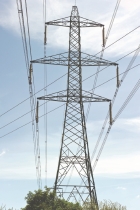Energy Secretary opens future energy debate

Government proposals to phase out unabated coal-fired power stations by 2025 and build new gas-fired power stations have received a wide range of mixed, but strong, reactions. Speaking at a meeting of the Institution of Civil Engineers, Amber Rudd, Secretary of State for Energy & Climate Change, set out her vision for an energy system that puts consumers first, delivers more competition, reduced the burden on bill payers and ensures enough electricity to power the nation.
She also explained that nuclear power had a central role in the UK’s energy future. ‘There are plans for a fleet of nuclear power stations, including at Wylfa and Moorside. It also means exploring new opportunities like small modular reactors, which hold the promise of low-cost low-carbon energy.
She also committed Government support for offshore wind on the condition that it comes down in cost. She said, ‘I can announce that if, and only if, the Government’s conditions on cost reduction are met, we will make funding available for three auctions in this Parliament. We intend to hold the first of these auctions by the end of 2016. On current plans, we expect to see 10 GW of offshore wind installed by 2020.’
She also referred to the role of energy efficiency; ‘One of the best ways to cut bills and cut carbon is to cut energy use itself. But the tax and policy framework designed to encourage this is complex, and we are now looking at streamlining it.’
BSRIA describes Amber Rudd’s statement as doing little more than indicating a vague direction of possible travel rather than the crisp, incisive and energy-efficiency-led statement that would have been more helpful as part of the UK drive towards 2050 obligations.
Julia Evans, chief executive, of BSRIA, said, “The Government has “abandoned" the cheapest forms of power — onshore wind and solar energy. We need some gas-fired stations, but these need to be partnered with investment in renewables and nuclear. BSRIA is anxious about the shrinking investment in renewables coupled with imprecise policy statements that will weaken this part of the market.
‘Environmentalists say nuclear and gas power are not the cheapest form of energy in the long run. Of course the UK cannot rely on renewables alone as yet so improvements in energy storage technologies are needed. Renewable energy should never be dismissed because of current concerns about reliability or continuity of supply.’
Dr Jenifer Baxter, head of energy and environment at the Institution of Mechanical Engineers, commented, ‘The announcement that all traditional coal-fired power plants will close by 2025 was expected but is a positive move. ‘However, although gas produces about half the amount of carbon emissions than coal, we should not look at building more gas powered plants as a silver bullet solution to creating a secure, affordable and clean energy system. Increasing demand for natural gas will lead to other “difficult” challenges in securing the gas network in the UK. This may include more imports and potentially greater use of shale gas.
‘The cheapest options for energy still remain the options that produce carbon emissions, like gas. The unfortunate reality is that reducing spending is likely to mean increasing emissions.
‘We cannot allow the market alone to drive energy options. Following this path means that we could end up with the worst case scenario in terms of pollution.’
Dave Sowden, chief executive of the Sustainable Energy Association, welcomed Amber Rudd’s description of energy efficiency as one of the best means to cut bills and carbon emissions. He observed, ‘The full range of sustainable energy technologies, applied in buildings is a key route to making our economy more efficient and productive. They remain an insufficiently tapped resource which can assist the Chancellor to deliver his long-term economic plan.
‘Greater ambition with regard to energy efficiency represents a greater appetite for delivering this long term improvement and overhaul of our economy.’
Paul Barwell, CEO of the Solar Trade Association, said, ‘It makes little sense to replace fossil coal only with fossil gas.
‘Gas and large-scale solar will soon need very similar levels of support, but unlike gas solar has the bonus of zero carbon emissions, future price certainty and no dependency on imports from unstable countries.
‘Solar has grown from providing 0% to the current 2% of UK electricity supply within just the last five years, and could get to 5% by 2020 with very little extra support. There is plenty of room to include solar alongside gas and nuclear in the coal phase out.’







